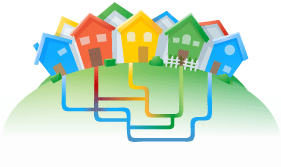
I’ve had a lot of people ask me last week what the deal is with the City of Raleigh’s announcement that AT&T has been selected as an NCNGN provider. Most want to know how this affects the city’s work to get us Google Fiber. I was curious, too, so I gave the City’s CIO, Gail Roper, a call.
OMG! Did Raleigh just kill Google Fiber?
Let me say right up front that Google Fiber is safe. The city has been working hard to complete Google’s checklist which is due back on May 1st. The city is still on track to respond by the May 1st deadline. With that out of the way, allow me to explain a bit what NCNGN is all about.
The N.C. Next Generation Network (NCNGN, pronounced “NC engine”) is a regional effort to define common standards for building out fiber networks and to attract providers willing to meet these standards. The participating government entities are using the NCNGN plan as a starting point for negotiations with broadband providers. The goal is to bring some uniformity and predictability to what can be a very expensive process by standardizing on as many aspects of a fiber build as possible.
A number of providers have submitted bids to participate in NCNGN with AT&T and Time Warner Cable being two who have publicly announced their participation. So what does last week’s announcement that the City of Raleigh has selected AT&T mean? It means that AT&T has agreed to meet the baseline NCNGN specifications, the City of Raleigh has agreed that AT&T meets the standard, and now AT&T and the city will begin negotiating all of the other details involved in a fiber rollout.
So does this mean we’re stuck with AT&T?
Not necessarily. It’s not an exclusive arrangement. Other providers could also meet the NCNGN standards and be approved for a fiber rollout; AT&T was simply the first.
AT&T already offers U-Verse service over copper lines. Is this new service just glorified U-Verse?
Not at all. AT&T will be providing legit, fiber-to-the-home service at speeds up to 1 Gbps. This is real fiber as specified in the NCNGN RFP.
Do the other NCNGN municipalities have to approve the AT&T deal?
They’re certainly welcome to, but whether they do or not it won’t affect the City of Raleigh’s negotiations with AT&T. With the City Council’s approval, negotiations on AT&T’s service have begun. Unless something drastic changes, Raleigh will soon have at least one fiber provider: AT&T.
So how does this affect Google Fiber?
The NCNGN really paved the way for Google Fiber by getting our community to think about what it would take for a fiber rollout to succeed. Permitting processes were reviewed, basic design standards were set, and – perhaps most importantly – Triangle leaders began to believe that one day ultrafast fiber networking could be a reality here.
So if NCNGN is so good, why isn’t Google Fiber using it?
Good question. Google brings its own experience to its anticipated Google Fiber buildouts in the Triangle, having had its Kansas City rollout to follow. The company is making use of the streamlined processes that NCNGN has brought but prefers to do things its own way. I suppose that’s Google prerogative. NCNGN providers are committed to providing service to all the participating NCNGN municipalities, for instance, and Google may have decided that they didn’t want to serve some of those markets for whatever reason. Either way, Google appears committed to bringing Google Fiber to the Triangle. Most of it, anyway.
What about the RST Fiber? How does it fit in?
RST Fiber is a Shelby-based company which recently announced its intention to build fiber networks in the Triangle. The company is leasing its statewide dark fiber from MCNC, among others. Plans are still being finalized for rolling out service to the “last mile” customers in the area, but a small pilot project is currently underway in the town of Wake Forest.
So where does Raleigh stand?
We now have three fiber providers who have plans to bring fiber Internet to the Triangle (and by that, I mean service to residential customers): Google Fiber, AT&T, and RST Fiber. That is a pretty encouraging sign that we have a strong market for better broadband. The competition we’ve been lacking for broadband service will soon become a reality, hopefully resulting in better service and lower prices in the near future. This is why the Triangle is lit up about fiber!